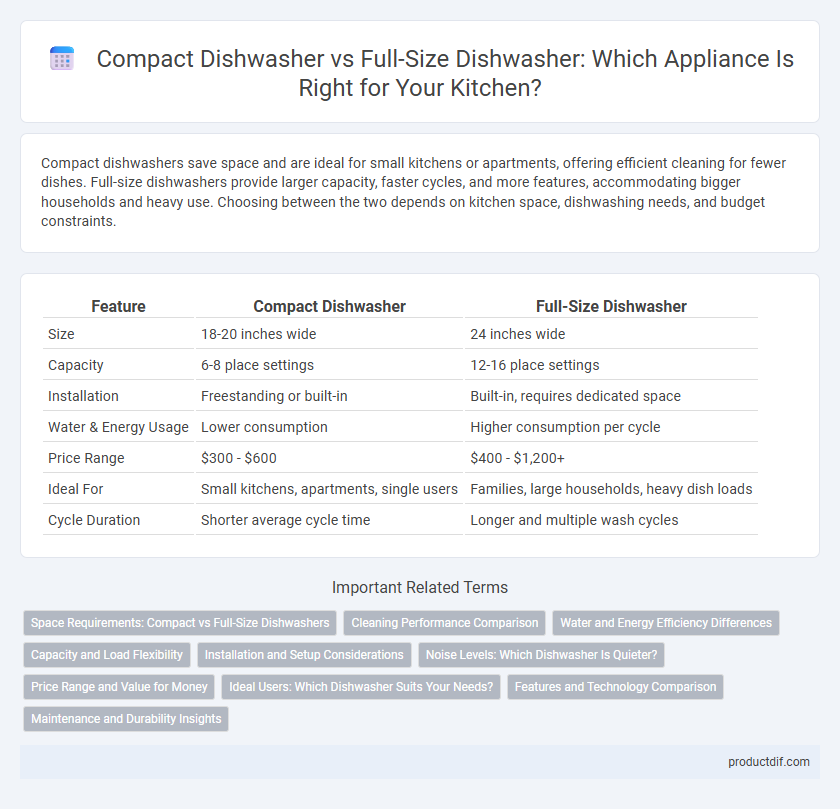Compact dishwashers save space and are ideal for small kitchens or apartments, offering efficient cleaning for fewer dishes. Full-size dishwashers provide larger capacity, faster cycles, and more features, accommodating bigger households and heavy use. Choosing between the two depends on kitchen space, dishwashing needs, and budget constraints.
Table of Comparison
| Feature | Compact Dishwasher | Full-Size Dishwasher |
|---|---|---|
| Size | 18-20 inches wide | 24 inches wide |
| Capacity | 6-8 place settings | 12-16 place settings |
| Installation | Freestanding or built-in | Built-in, requires dedicated space |
| Water & Energy Usage | Lower consumption | Higher consumption per cycle |
| Price Range | $300 - $600 | $400 - $1,200+ |
| Ideal For | Small kitchens, apartments, single users | Families, large households, heavy dish loads |
| Cycle Duration | Shorter average cycle time | Longer and multiple wash cycles |
Space Requirements: Compact vs Full-Size Dishwashers
Compact dishwashers typically measure 18 inches in width, making them ideal for small kitchens, apartments, or limited counter space. Full-size dishwashers usually require 24 inches of width and can handle larger loads, making them suitable for bigger households. Space requirements play a critical role in selecting the right dishwasher, as compact models offer flexibility in tight spaces while full-size models deliver more capacity and functionality.
Cleaning Performance Comparison
Compact dishwashers typically feature smaller wash arms and fewer spray jets, resulting in slightly less effective cleaning performance compared to full-size dishwashers. Full-size dishwashers often provide higher water pressure and more powerful wash cycles, enhancing their ability to remove tough, baked-on food debris. Studies indicate full-size models achieve a 95% cleaning efficiency rate on average, whereas compact units tend to score around 85%.
Water and Energy Efficiency Differences
Compact dishwashers typically use 3-5 gallons of water per cycle, making them more water-efficient than full-size models, which consume around 6-12 gallons. Energy consumption for compact dishwashers ranges from 210 to 240 kWh per year, while full-size units generally use 270 to 350 kWh annually. Choosing a compact dishwasher can significantly reduce both water and energy usage, ideal for small households or spaces with limited utility resources.
Capacity and Load Flexibility
Compact dishwashers typically offer a capacity of 6 to 8 place settings, ideal for small households or limited kitchen spaces, while full-size dishwashers accommodate 12 to 16 place settings, supporting larger families. Load flexibility varies, with full-size models featuring adjustable racks, fold-down tines, and multiple wash zones for diverse dish types and sizes. Compact dishwashers, though more limited in load options, often include versatile rack designs to maximize space efficiency within their smaller footprint.
Installation and Setup Considerations
Compact dishwashers require less space and can often fit into smaller kitchens or apartments, making installation simpler in tight areas. Full-size dishwashers usually need more extensive plumbing and electrical connections, demanding professional installation for optimal performance. Choosing between the two depends on kitchen layout, available space, and plumbing compatibility to ensure seamless setup.
Noise Levels: Which Dishwasher Is Quieter?
Compact dishwashers typically produce noise levels around 48-52 decibels, making them quieter for small kitchen spaces. Full-size dishwashers often range from 44-50 decibels, with high-end models featuring advanced insulation for noise reduction. Choosing a dishwasher depends on balancing capacity needs with desired noise levels, as full-size units can be quieter but vary by brand and model.
Price Range and Value for Money
Compact dishwashers typically range from $250 to $500, offering significant savings compared to full-size models priced between $400 and $1,200. While compact units save space and energy, their smaller capacity suits singles or small households, providing good value for limited use. Full-size dishwashers deliver greater capacity and advanced features, justifying higher costs for larger families and frequent dishwashing needs.
Ideal Users: Which Dishwasher Suits Your Needs?
Compact dishwashers are ideal for individuals or small households with limited kitchen space, offering efficient cleaning in tight quarters while conserving water and energy. Full-size dishwashers suit larger families or those who frequently entertain, providing higher capacity and faster cycles to handle increased dish loads. Choosing between the two depends on kitchen size, daily dish volume, and user lifestyle preferences.
Features and Technology Comparison
Compact dishwashers typically offer space-saving dimensions around 18 inches wide and incorporate advanced features such as quick wash cycles, energy-efficient technology, and silent operation suitable for small kitchens. Full-size dishwashers, measuring approximately 24 inches wide, provide greater capacity, adjustable racks, multiple wash cycles including heavy-duty and steam options, and smart connectivity for remote operation. Both models often include stainless steel interiors, soil sensors, and eco-friendly modes, but full-size units excel in accommodating larger households with enhanced cleaning power and versatility.
Maintenance and Durability Insights
Compact dishwashers often require more frequent filter cleaning due to their smaller capacity and higher usage intensity, while full-size dishwashers benefit from more robust construction materials that enhance long-term durability. Maintenance for compact models typically involves regular checks of the door seals and spray arms to prevent leaks and clogs, whereas full-size units may need periodic inspection of pumps and heating elements to sustain optimal performance. Choosing between the two depends on balancing space constraints with maintenance willingness and desired appliance lifespan.
Compact dishwasher vs full-size dishwasher Infographic

 productdif.com
productdif.com